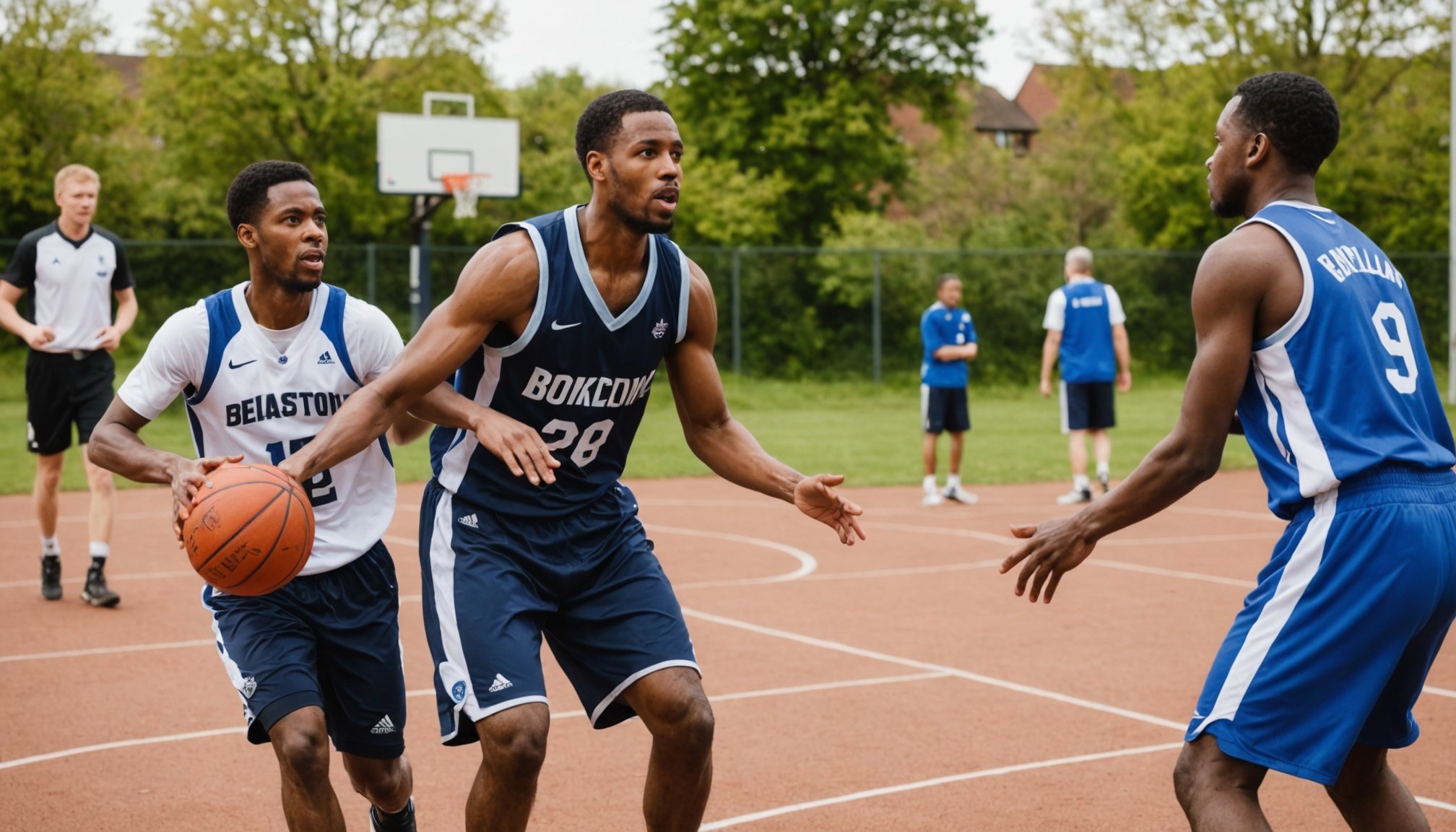Overview of Basketball’s Role in UK Community Well-Being
Basketball holds a unique position in UK communities as an accessible and engaging sport. Its popularity spans various age groups and backgrounds, making it a powerful tool for fostering community well-being. Through regular participation, basketball creates opportunities for individuals to connect, promoting social cohesion and reducing isolation.
The social benefits of basketball are notable, extending beyond physical activity. Engagement in basketball encourages teamwork, communication, and mutual support, which strengthen neighborhood ties. Additionally, the sport positively impacts mental health by offering stress relief and a sense of achievement. Participants often report increased confidence and improved mood after games or training sessions.
Also to discover : Will british basketball rise to global prominence?
In the UK context, basketball addresses rising concerns about sedentary lifestyles and social fragmentation by encouraging active and inclusive participation. Recent trends show growth in grassroots initiatives and community leagues, emphasizing sports’ role in public health strategies. This growing presence demonstrates how basketball contributes to both individual well-being and collective social capital across diverse urban and rural communities.
Societal and Community Cohesion Benefits
Exploring basketball’s role in uniting communities and engaging youth
Also to discover : Maximizing youth basketball engagement through uk sporting events
Basketball offers significant social benefits by actively strengthening community cohesion. In many UK neighbourhoods, basketball serves as a vibrant catalyst for building stronger ties among residents. It brings diverse groups together, creating shared experiences that foster a collective community identity. This is particularly visible in areas where cultural diversity could pose challenges in social integration.
Youth engagement in the UK is notably bolstered through basketball-focused initiatives. After-school programs using basketball provide structured environments where young people can develop teamwork, discipline, and self-confidence. These programs reduce negative influences by keeping youth involved in positive, goal-oriented activities. As a result, communities see reduced antisocial behaviour and improved outcomes for at-risk youth.
Importantly, basketball bridges cultural and demographic divides. The sport’s universal appeal encourages friendships and understanding among people from varying backgrounds. Through participation in local leagues or pick-up games, individuals connect beyond cultural differences, promoting inclusivity and mutual respect. This ability to unite people highlights basketball’s unique power as a tool for lasting community cohesion and social development.
Physical and Mental Health Outcomes
Basketball offers significant basketball health benefits UK players can readily enjoy. Engaging in this sport promotes regular physical activity, which is crucial for maintaining cardiovascular health, muscle strength, and overall fitness. The dynamic nature of basketball—combining running, jumping, and quick lateral movements—ensures a well-rounded workout that enhances endurance and coordination.
On the mental health front, basketball contributes positively by reducing stress and improving self-esteem. Participating in games or practice sessions fosters social connections, which are essential components of mental health programs aimed at combating loneliness and depression. The teamwork aspect nurtures a sense of belonging and community.
Various adapted programs have been developed to make basketball accessible to different age groups and abilities. For example, organizations offer tailored sessions for seniors focusing on low-impact exercises or for youth with disabilities to encourage inclusivity within physical activity routines. These initiatives underscore the sport’s versatility as a tool for encouraging a healthier lifestyle.
In short, the integration of basketball into health initiatives highlights its dual role in enhancing both physical fitness and mental well-being across diverse UK populations.
Reducing Crime and Supporting At-Risk Youth
Basketball has emerged as a powerful tool for crime reduction and addressing anti-social behaviour in the UK. Numerous studies highlight a strong correlation between youth participation in basketball programs and decreased involvement in criminal activities. This link results from basketball’s capacity to provide structure, discipline, and positive social engagement, crucial for vulnerable young people.
Targeted youth intervention initiatives leverage basketball to engage at-risk and disadvantaged youth in meaningful activities. These programs often combine coaching with mentoring, skill development, and education to foster self-esteem and community belonging. When young individuals find purpose and connection through basketball, the allure of criminal behaviour diminishes notably.
Success hinges on effective collaboration. Partnerships with law enforcement and local councils play a vital role in sustaining basketball programs designed for crime prevention. These partnerships facilitate resource allocation, safe venues, and outreach efforts, creating a supportive ecosystem. By integrating basketball into broader community safety strategies, these initiatives reach deeper and achieve long-lasting impacts on reducing anti-social behaviour in the UK.
Economic and Environmental Aspects of Basketball Facilities
Balancing community needs with sustainability and growth
Investment in basketball facilities UK significantly impacts local economies by creating jobs and stimulating business activity. Constructing modern courts and multipurpose facilities attracts events that boost commerce, from hospitality to retail. Community sports funding often supports such projects, emphasizing accessibility to ensure health benefits extend to all residents.
Economic benefits sports bring are far-reaching. Beyond direct employment for construction and operations, these facilities encourage regular participation, lowering healthcare costs in underserved urban areas. Additionally, the presence of well-maintained basketball facilities can increase surrounding property values, demonstrating a tangible return on community sports funding.
Environmental considerations are equally vital. Sustainable sports infrastructure minimizes resource use and waste. Incorporating eco-friendly materials, energy-efficient lighting, and water-saving measures can reduce operational carbon footprints. For example, using recycled surfaces or solar panels in basketball facilities UK aligns with broader climate goals without compromising functionality.
Balancing economic benefits sports enable with environmental stewardship creates resilient community hubs. This approach promotes longevity, cost savings, and inclusiveness—ensuring basketball facilities serve future generations efficiently and equitably.
Real-World Examples and UK Case Studies
Real-world basketball case studies in the UK reveal significant community benefits. Programs in cities like London and Manchester demonstrate how basketball fosters social inclusion and physical health. For example, initiatives targeting youth in underprivileged areas have reduced antisocial behaviour by over 20% in some districts.
Community initiatives often partner with schools and local councils to provide accessible training and tournaments. By focusing on teamwork and discipline, these basketball programs build confidence and resilience among participants. This approach aligns with expert opinions emphasizing sport’s role in mental well-being.
Experts agree that basketball’s fast pace and team emphasis uniquely engage diverse participants, often more effectively than individual sports. Community leaders note that basketball courts serve as safe, social spaces where young people develop lasting relationships.
Comparing basketball to other sports, UK data consistently shows higher youth participation rates in urban areas, highlighting its appeal. Moreover, basketball’s inclusivity supports broader community cohesion, contributing to overall well-being.
These basketball case studies UK reflect growing recognition of sport as a tool for positive social change. Understanding these successes encourages wider sports integration into community health strategies.








